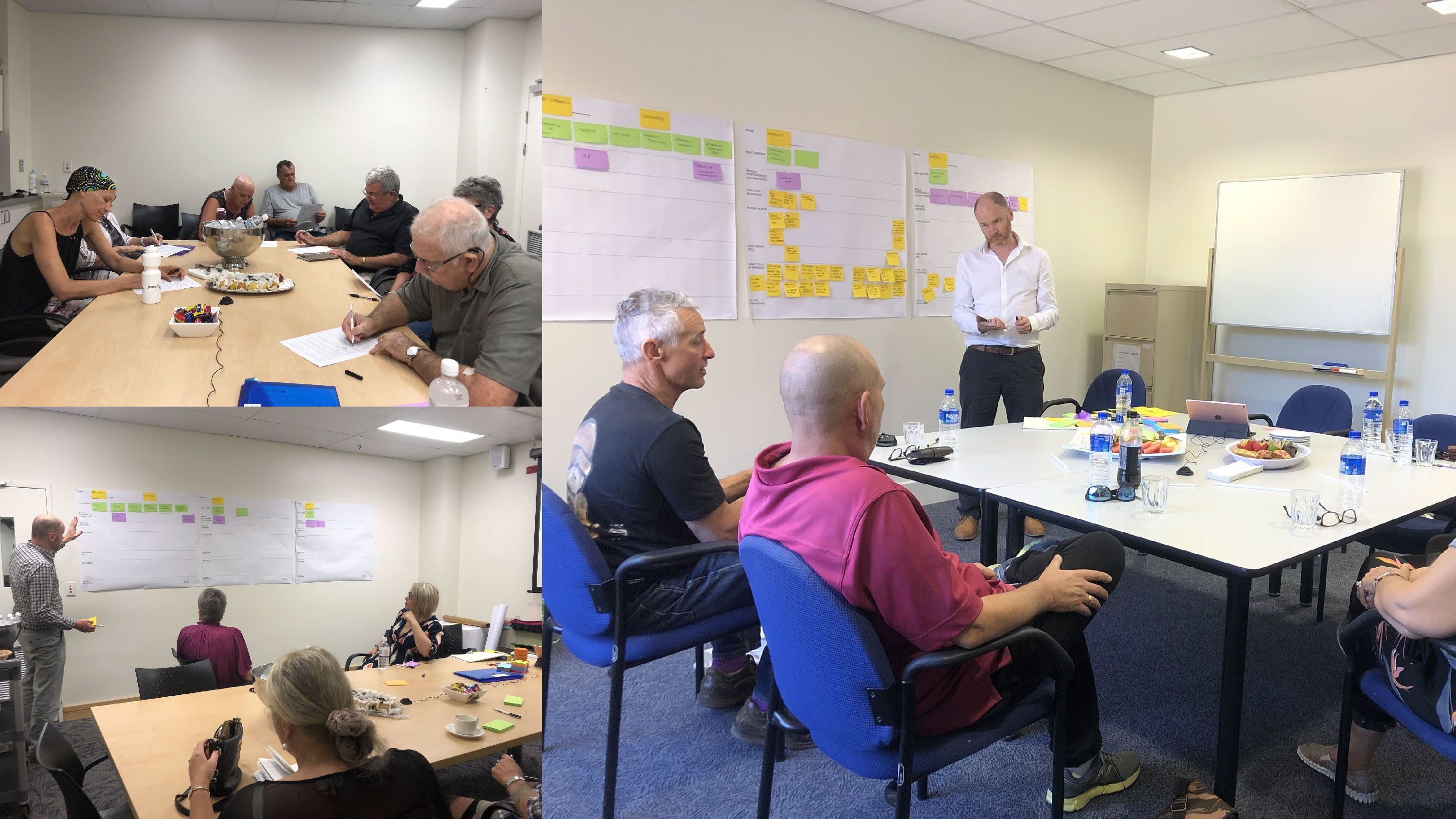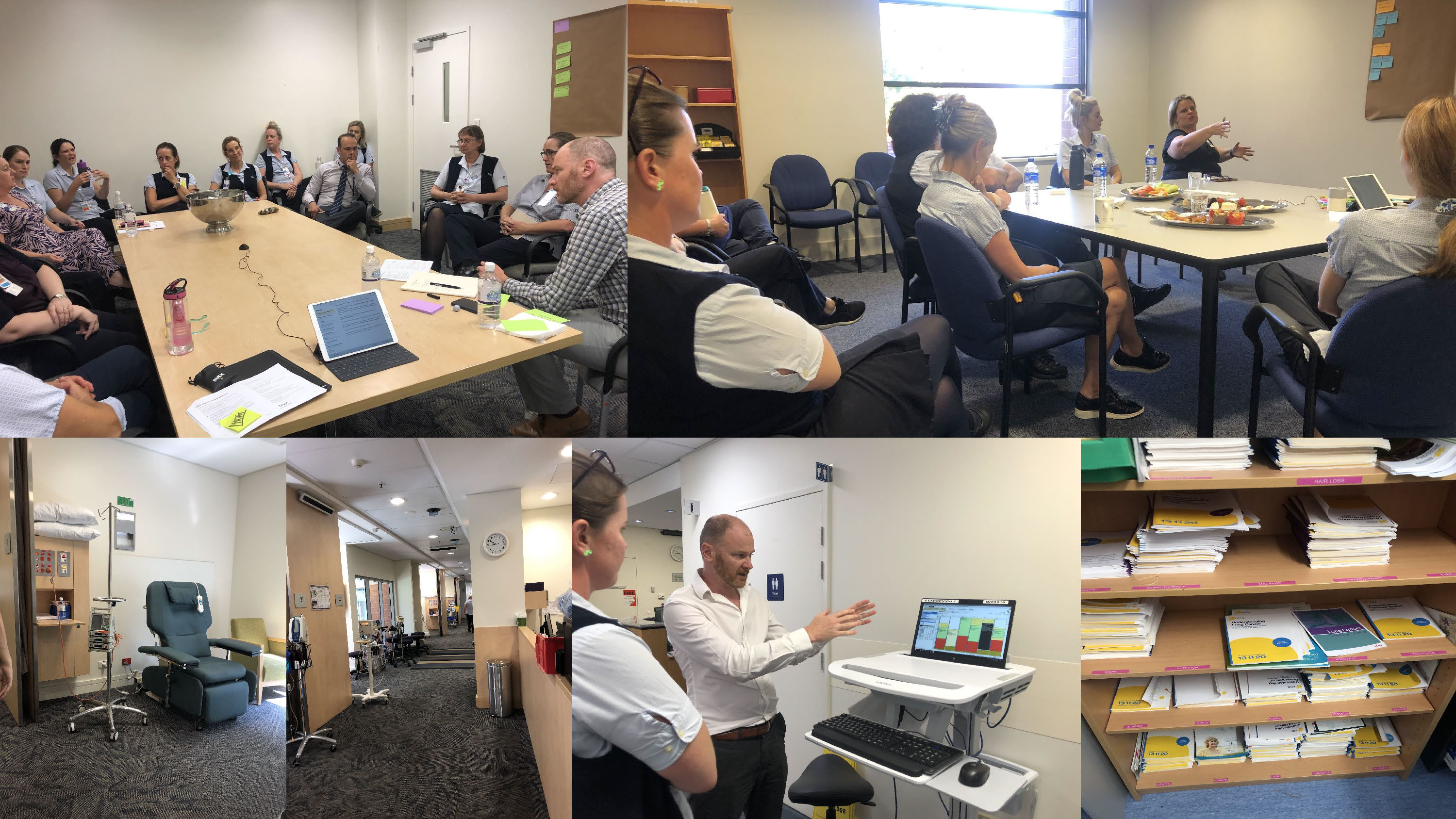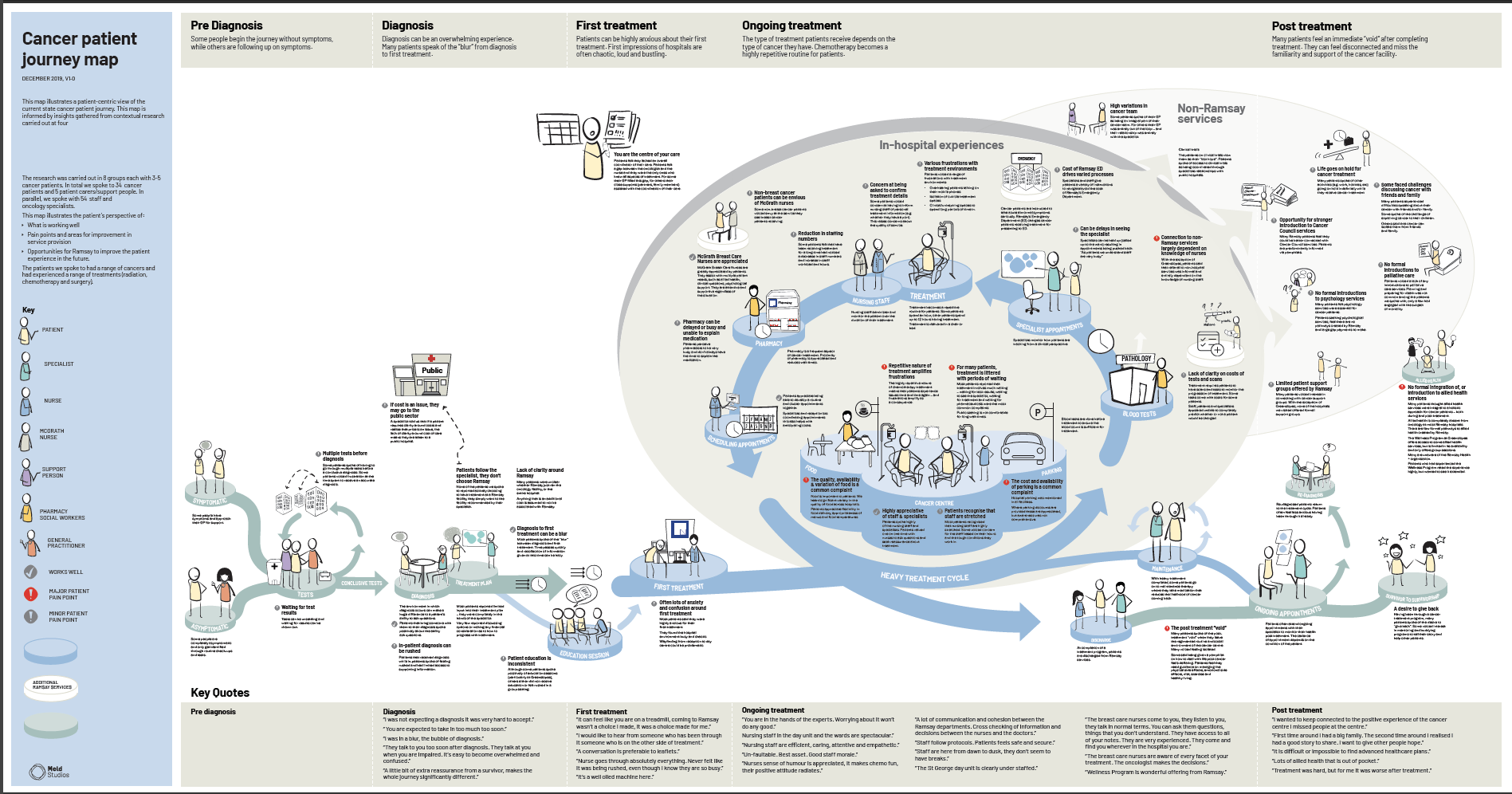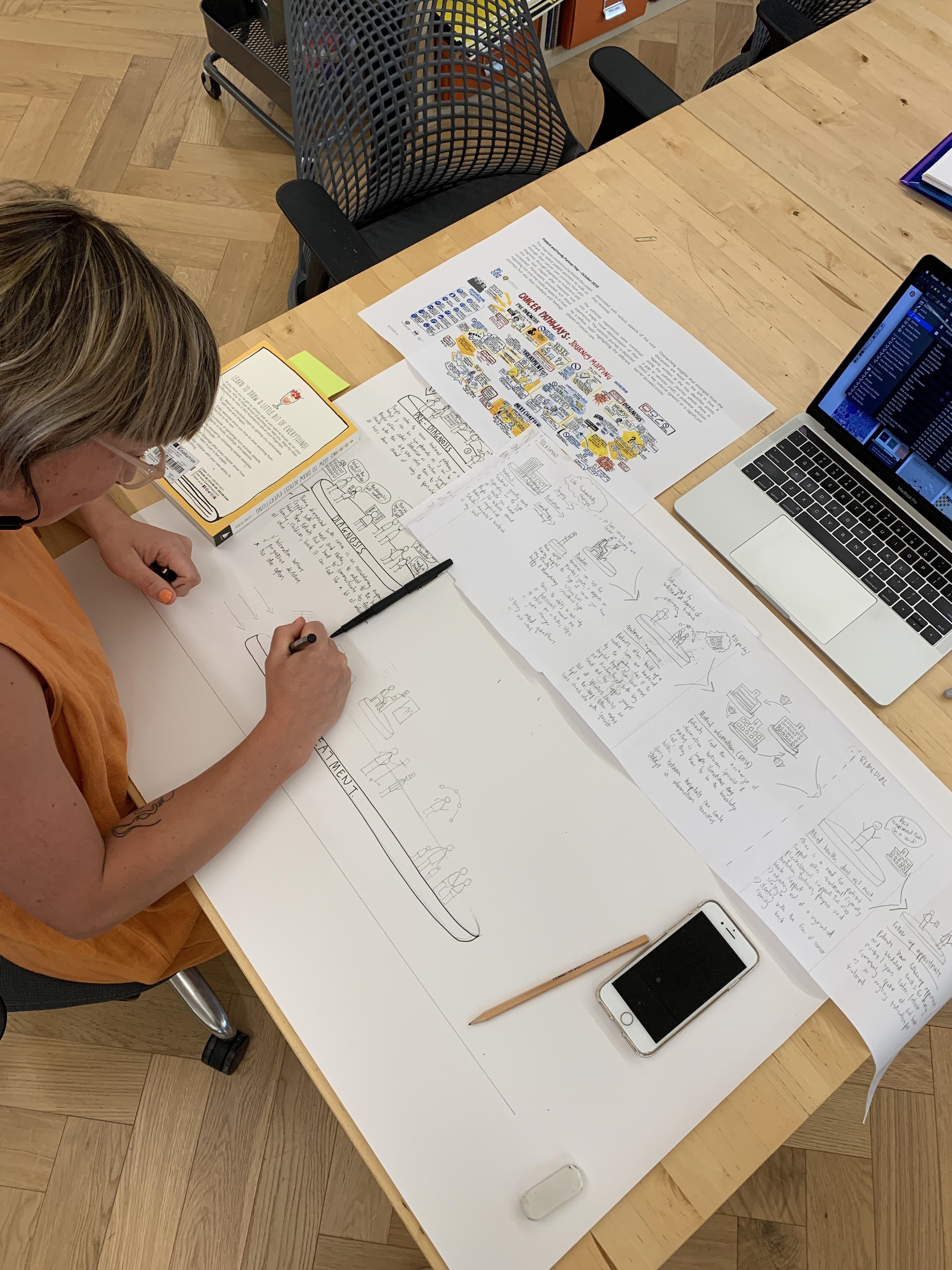Oct - Dec 2019 with Meld Studios
Project team: Iain Barker (Principal designer) and myself
Client (name cannot be shared due to NDA’s)
Project challenge
Going through cancer treatment is often a life altering event. People often feel a sense of isolation and a desire for greater support. The healthcare organisation we worked with recognised the need to improve the oncology experience to better inform patient outcomes from initial diagnosis through to post treatment recovery.
Project approach
We were engaged to carry out qualitative research with cancer patients, oncology staff, and specialists to develop an understanding of the current oncology experience as well as people’s aspirations for the future service offering. Whilst the research focused on the patient experience, this work also generated insights about how larger systemic policies and funding decisions have a significant impact on their overall experience of cancer treatemtn.
We conducted qualitative research with 93 people via in person workshops in five locations; Sydney, Brisbane, Perth and Melbourne. We engaged with a combination of Oncology staff including nurses, oncologists and hematologists and patients who were in a wide range of the various stages of treatment, some with a terminal diagnosis. During the sessions we spoke to staff about what’s working well, what could be improved for future patients and what the priorities were. In parallel, we conducted qualitative research with 34 patients. The insights from patient research inform the Cancer patient journey map and are used to augment findings from our staff research.
Research sessions
In total we conducted 5 focus group sessions with nursing staff, doctors and/or other staff providing services to cancer patients. We also conducted 4 one-on-one interviews with doctors. Each of these sessions broadly followed a line of ‘natural inquiry’ – we asked a broad opening question and allowed the responses dictate the follow-up discussion. In addition to the open line of inquiry, where the topic didn’t naturally arise, we also asked participants explicitly about:
Engaging with patients, oncologist, nurses, healthcare workers and support services.
![]()
![]()
Project outcomes and outputs
The patient research enabled us to identify future opportunities for the healthcare provider. One of the resounding opportunities was to connect patients with non-hospital based services such as community and allied health services to support with coping and recovering from cancer treatment. To address the wide variability in the discovery of support services. Some patients discover services themselves or via recommendations from other cancer service providers or simply don’t discover them. Other opportunities included helping demystify the cancer diagnosis and treatment journey for patients, creating consistent treatment experiences across hospitals, brining greater clarity to the costs involved and improving the experience of oncology staff.
The key findings and opportunities of the Oncology staff and specialist ethnographic research were summarized in a detailed report and visualized through the Current State Cancer Patient Journey map:
![]() (please click to expand)
(please click to expand)
Sketching out the current state cancer patient journey
![]()
Home
Project team: Iain Barker (Principal designer) and myself
Client (name cannot be shared due to NDA’s)
Healthcare organisation
Project challenge
Going through cancer treatment is often a life altering event. People often feel a sense of isolation and a desire for greater support. The healthcare organisation we worked with recognised the need to improve the oncology experience to better inform patient outcomes from initial diagnosis through to post treatment recovery.
Project approach
We were engaged to carry out qualitative research with cancer patients, oncology staff, and specialists to develop an understanding of the current oncology experience as well as people’s aspirations for the future service offering. Whilst the research focused on the patient experience, this work also generated insights about how larger systemic policies and funding decisions have a significant impact on their overall experience of cancer treatemtn.
We conducted qualitative research with 93 people via in person workshops in five locations; Sydney, Brisbane, Perth and Melbourne. We engaged with a combination of Oncology staff including nurses, oncologists and hematologists and patients who were in a wide range of the various stages of treatment, some with a terminal diagnosis. During the sessions we spoke to staff about what’s working well, what could be improved for future patients and what the priorities were. In parallel, we conducted qualitative research with 34 patients. The insights from patient research inform the Cancer patient journey map and are used to augment findings from our staff research.
Research sessions
In total we conducted 5 focus group sessions with nursing staff, doctors and/or other staff providing services to cancer patients. We also conducted 4 one-on-one interviews with doctors. Each of these sessions broadly followed a line of ‘natural inquiry’ – we asked a broad opening question and allowed the responses dictate the follow-up discussion. In addition to the open line of inquiry, where the topic didn’t naturally arise, we also asked participants explicitly about:
- Opportunities for more integrated care
- Opportunities for more consistent carez
- Opportunities for trials and research.
Engaging with patients, oncologist, nurses, healthcare workers and support services.


Project outcomes and outputs
The patient research enabled us to identify future opportunities for the healthcare provider. One of the resounding opportunities was to connect patients with non-hospital based services such as community and allied health services to support with coping and recovering from cancer treatment. To address the wide variability in the discovery of support services. Some patients discover services themselves or via recommendations from other cancer service providers or simply don’t discover them. Other opportunities included helping demystify the cancer diagnosis and treatment journey for patients, creating consistent treatment experiences across hospitals, brining greater clarity to the costs involved and improving the experience of oncology staff.
The key findings and opportunities of the Oncology staff and specialist ethnographic research were summarized in a detailed report and visualized through the Current State Cancer Patient Journey map:
 (please click to expand)
(please click to expand) Sketching out the current state cancer patient journey

Home